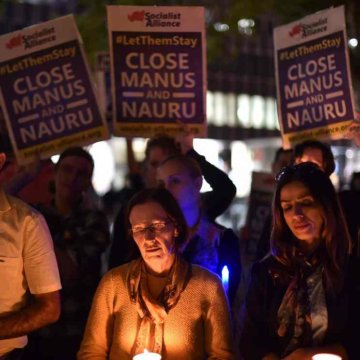- About
- Topics
- Picks
- Audio
- Story
- In-Depth
- Opinion
- News
- Donate
- Signup for our newsletterOur Editors' Best Picks.Send
Read, Debate: Engage.
| located: | Australia |
|---|---|
| editor: | Vanessa Ellingham |
Last week 23-year-old Iranian Omid Masoumali set himself on fire in protest at his ongoing detention on Nauru, one of two offshore detention centres run by the Australian government as a deterrent for asylum seekers arriving by boat.
As UN Refugee Agency staff paying a monitoring visit looked on, Masoumali, who had been held in detention for three years despite being legally recognised as a refugee, grabbed their attention, setting himself alight.
“This action will prove how exhausted we are," he yelled. "I cannot take it any more.”
He would later in die in hospital of his injuries, after what his widow described as abysmal medical treatment.
She says it was hours before he was given painkillers, in the Nauru hospital where "they couldn't even find a clean syringe". It was 22 hours before he was flown to hospital in Australia, where he would later die.
So not only is Australia placing asylum seekers in other countries where they receive terrible treatment, including the threat of physical and sexual abuse, but if someone requires medical treatment, the local hospital is ill-equipped to provide care.
And the story just gets worse: Masoumali was one of two refugees to self-immolate in Nauru over the last week. On Monday evening, Somali refugee Hodan Yasi also set herself alight, and reportedly now has burns to 70% of her body.
Yasi only returned to Nauru last week after a motorcycle accident in November had her sent to Australia for medical treatment. She is now back in hospital in Brisbane, said to be in a critical condition.
In the days between Masoumali and Yasi’s public acts of self-harm, at least six suicide attempts have been reported on Nauru, ranging from people swallowing razor blades, ingesting washing powder or attempting to hang themselves using bed sheets.
So what does the Australian immigration minister have to say about these horrific calls for help?
Peter Dutton blames the rise in the number of suicide attempts on Australian refugee advocates encouraging people to harm themselves. Because of course his own government's policy cannot possibly be to blame.
“I have previously expressed my frustration and anger at advocates and others who are in contact with those in regional processing centres and who are encouraging some of these people to behave in a certain way, believing that that pressure exerted on the Australian government will see a change in our policy,” Dutton said.
Refugee advocates say the allegations are offensive and desperate. They say they spend hours counselling people not to hurt themselves.
Last week Papua New Guinea asked Australia to make alternative arrangements for the 850 asylum seekers currently detained on its Manus Island, many of whom have legal refugee status already and have no reason to remain in detention.
As the Australian election campaign kicks off this week, it looks set to be another election focused mainly on immigration policy, after Tony Abbott's "Stop the Boats" campaign in 2013, and similar messaging in 2001 and 2003.
Both main parties broadly agree on Australia's current policy of detaining asylum seekers offshore.
But there were vigils held for Omid Masoumali and protests across Australia this week following the high number of suicide attempts. Australia's international standing is increasingly threatened.
Is any mainstream Australian political party prepared to cut the party line in favour of basic human rights? Can any party afford not to?
